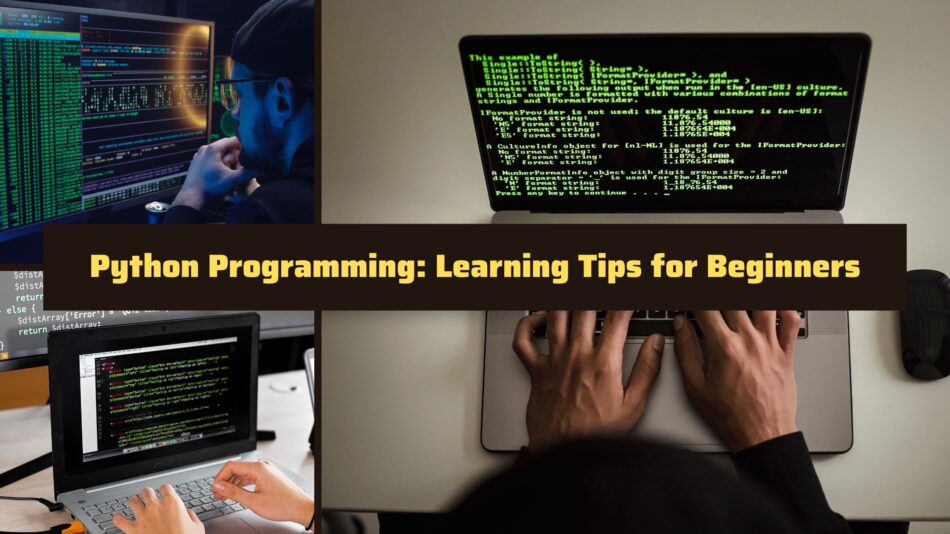Are you new to Python programming? If not, we assume you will be seeking details on why and how to begin using Python. Fortunately, a proficient programmer in any programming language (whatever it may be) can easily become proficient in Python. On the other side, learning Python programming could be challenging for someone who is new.
Programming with Python is simple. All you just need is the appropriate strategy to start. However, if you are a beginner to Python programming and looking for tips on how to learn programming in a fun and effective way, you have come to the right place. In this article, we have covered top learning Python programming tips and tactics for beginners. So, what are you waiting for? Read the article till the end.
What Is Python Programming?
In the 1980s, Guido Rossum created Python, a popular high-level and object-oriented programming language. In 1991, it became initially accessible. The name “Python” pays tribute to the British comedy troupe Monty Python and is intended to be both simple and hilarious. Java has been replaced by Python as the most popular entry-level language because of its reputation for being user-friendly for beginners. This is because Python handles the majority of the complexity for users, enabling beginners to focus on fundamental concepts rather than minute details.
However, learning Python is not easy as it seems. This is why many students look for Python programming assignment help so that they can learn it more efficiently with the help of experts.
Tips for Beginners to Learn Python Programming
Python learning might take anything from two to six months. The tips listed below would also make it straightforward to learn this language, regardless of whether you have a prior understanding of coding in any language.
- Code daily
Being consistent is crucial while learning a new language. Making a daily commitment to code is something we recommend. Programming mainly relies on muscle memory, which might be difficult to comprehend. Choosing to code every day will make a major difference in creating that muscle memory. Even though it could initially feel overwhelming, think about beginning with only 25 minutes a day and building up from there.
- Take notes
You might ask if taking notes is necessary as you grow as a beginning programmer. Of course, you should! In fact, research suggests that handwritten notes improve long-term memory the most. Given that many interviews require candidates to write code on a whiteboard, this will be especially helpful for those pursuing the dream of working as developers full-time. Once you begin working on smaller projects and programs, planning your code by hand may also be helpful before switching to the computer.
- Make it interactive
The interactive Python shell will be one of your finest learning resources, whether you are learning about fundamental Python data structures for the first time (strings, lists, dictionaries, etc.) or you are troubleshooting a program. Use the interactive Python shell only after installing Python on your computer. Simply launch Python or python3, depending on your installation, in your terminal to start the interactive Python shell.
- Impart knowledge
It’s been claimed that imparting knowledge or teaching something is the greatest way to learn it. This is also valid for studying Python. There are various ways to accomplish this, including white boarding with other Python enthusiasts, creating blog entries outlining recently taught concepts, making movies outlining freshly acquired knowledge, or simply chatting to yourself at your computer. Each of these methods will help you comprehend more clearly and will also show you where your knowledge is lacking.
- Collaborate with people who are learning
While programming may appear to be a solo endeavor, teamwork is necessary for it to be successful. You must surround yourself with others who are also studying programming in Python if you want to succeed. However, if you don’t know anyone, don’t worry. There are many ways to connect with individuals who are enthusiastic about studying Python! Join the Pythonista Cafe, a peer-to-peer learning network for Python enthusiasts like you, or look for local events or Meet-ups.
- Pair program
Pair programming is a method where two programmers collaborate at the same workstation to finish a task. The two developers alternate playing the roles of “driver” and “navigator,” respectively. The “navigator” creates the code, while the “driver” helps in problem-solving and reviews it as it is written. Pair programming offers several advantages since it allows you the ability to see how someone else could approach an issue in addition to having their code reviewed.
- Create anything
By developing little programs, you can really develop the muscle memory. It’s time to start constructing after you have a firm understanding of object-oriented programming, creating classes, and fundamental data structures (strings, lists, dictionaries, and sets). The process of construction itself is what will educate you the most. The majority of your education will be gained via building things with Python. The challenges you overcome will teach you a lot. However, if at any stage you get stuck, you can also take help from Python programming coursework services online where you will be guided by professionals.
- Take breaks in between
It is crucial to take a break during learning so that you can fully comprehend concepts. The popular and helpful Pomodoro Technique is working for 25 minutes, taking a little break, and then repeating the process. Also, if you want to study well, especially when you are learning a lot of new content, you must take pauses. Breaks are particularly crucial for debugging. If you encounter a problem and are having problems determining what’s wrong, stop. Go for a walk or have a conversation with a buddy to take a break from your computer.
You are prepared to start your Python journey now that you have these learning techniques! So, what are you waiting for? Start your Python journey now.









